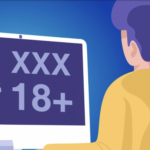Is It Illegal To Show An R 18+ Movie or Video Game to a Minor?

From slasher films to action blockbusters, some of the best movies are rated R18+. But how do you as a parent respond when your child wants to see a film restricted to adults?
You might be surprised to learn that there are penalties attached to showing R18+ films to minors, even if you’re a parent showing the movie to your child in your own home.
Here’s what you need to know.
Film Classification in Australia
Most films which are to be sold, exhibited or distributed in Australia must first be classified by the Australian Classification Board.
Currently, this includes films shown in cinemas, those sold on DVD and Blue-ray as well as films uploaded onto streaming services (other than Netflix). Exceptions exist for films shown on TV or streaming on Netflix, which can be ‘self-classified’ without going through the Board, a process likely to become more common in the future.
Films can be classified as G, PG, M, MA 15+, R 18+ or X 18+ depending on their content, with each marker recommending an appropriate age for consumers. Both R 18+ and X 18 + markers are restricted to adults.
Films are classified on the basis of six key elements:
- Themes
- Violence
- Sex
- Language
- Drug use
- Nudity
According to the Film Guidelines, the Board will classify a film R18+ if:
- Themes are ‘high impact’
- Content could be considered ‘offensive’ to sections of the adult community.
- Depictions of violence, (simulated) sex, language, drug use and nudity are not justified sufficiently in context or are considered unsuitable for minors between 15 and 18 years old.
If a film contains unstimulated sex it will be classified as X 18+ (or refused classification in some instances). Showing X 18+ films to minors is a much more serious business, which we have dealt with in a seperate article.
Offences for Showing R 18+ Films To Minors
The Classification (Publications, Films and Computer Games) Enforcement Act 1995 (NSW) prescribes a range of minor offences for the sale and exhibition of R 18+ films to minors in NSW, including when being shown by their parents.
Section 9(2) of the Act outlines an offence for selling or delivering an R 18+ film to minors under the age of 18. This carries a maximum penalty of an $11,000 fine for an individual and a $22,000 fine for a corporation.
Section 23 of the Act outlines an offence for publicly exhibiting an R 18+ film in the presence of minors, which carries a penalty of a $5,500 fine for an individual and a $11,000 fine for a corporation.
Section 10 of the Act outlines an offence for any parent or guardian permitting a minor to attend a public exhibition an R 18+ film, carrying a $2,200 fine.
Finally, section 17 of the Act outlines an offence of privately exhibiting a R 18+ film in the presence of a minor, carrying a $5,500 fine.
Video Game Classification in Australia
Video games are classified similar to films in Australia utilising a G, PG, M, MA 15+, R 18+ system.
Films are classified on the basis of six key elements:
- Themes
- Violence
- Sex
- Language
- Drug use
- Nudity
According to the Video Game Guidelines, the Board will classify a game R18+ if:
- Themes are ‘high impact’
- Content could be considered ‘offensive’ to sections of the adult community.
- The game contained nudity (although depictions of actual sexual activity are not permitted).
- Depictions of violence are ‘high impact’ (although they cannot be frequently gratuitous, exploitative and offensive to a reasonable adult).
- The game contains drug use (although interactive illicit or proscribed drug use that is detailed and realistic is not permitted).
Offences for Showing R 18+ Games To Minors
The Classification (Publications, Films and Computer Games) Enforcement Act 1995 (NSW) prescribes a range of minor offences for the sale and public demonstration of R 18+ games to minors in NSW, including when being shown by their parents.
Section 30 of the Act outlines an offence for selling or delivering an R 18+ game to minors under the age of 18. This carries a maximum penalty of an $16,500 fine (or two years imprisonment) for an individual and a $33,000 fine for a corporation.
Section 30A of the Act outlines an offence for parents who allow their children to attend a ‘public demonstration’ of an R18+ game. This offence carries a penalty of a $2,200 fine.
A general offence under section 31A also applies to anyone who publicly demonstrates an R18+ game in the presence of a minor. This carries a maximum penalty of a $5,500 fine for an individual or $11,000 for a corporation.
To “publicly demonstrate” a computer game means to demonstrate the computer game:
- in a public place, or
- so that it can be seen from a public place.
Finally, section 33 of the Act outlines an offence of privately demonstrate a R 18+ game in the presence of a minor, carrying an $11,000 fine.
Is It Really So Bad?
It’s arguable that some of the penalties attached to the showing of R 18+ films or games to minors are excessive and not in keeping with community expectations.
Even the Classification Board admits that:
As a parent or carer, you are the best person to decide which films and computer games are ok for your child to watch and play. You know what your child can understand and cope with, and the types of content that might upset them or cause concern for you.
Whether a particular film could be upsetting or even traumatising for a child depends greatly on the individual. Moreover, classification markers may be a poor indicator of potential harm.
One US study found that more than one-third of children scared by movies to the point of having disturbed sleep or anxiety, named a G or PG rated movie as the cause.
Whilst nobody is arguing it’s ok to show the latest gory horror film or game to a 7 year old, parents should be able to to decide what’s best and most appropriate for children, particularly in their teenage years.






